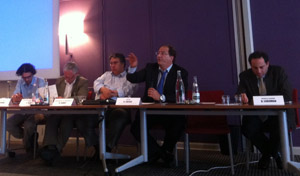 Experts from Femise (Forum EuroMéditerranéen des Instituts de Sciences Économiques) delivered their Firms, Trade and Development reports at a workshop organised by FEMISE and Defi, the research centre of the Université de la Méditerranée (Aix-Marseille II) in collaboration with GDR-CNRS (économie du développement et de la transition) and CARIS (University of Sussex, Brighton, UK), on economic development and international finance in Aix-en-Provence on 4-5 July 2011. In delivering their conclusions, these scientists made several observations that could also been as appeals for assistance.
Experts from Femise (Forum EuroMéditerranéen des Instituts de Sciences Économiques) delivered their Firms, Trade and Development reports at a workshop organised by FEMISE and Defi, the research centre of the Université de la Méditerranée (Aix-Marseille II) in collaboration with GDR-CNRS (économie du développement et de la transition) and CARIS (University of Sussex, Brighton, UK), on economic development and international finance in Aix-en-Provence on 4-5 July 2011. In delivering their conclusions, these scientists made several observations that could also been as appeals for assistance.
“The role of economists is to push back the frontiers of knowledge and make recommendations in the area of economic policy. Yet academic research is hindered by a lack of data,” explains Patrick Plane of Cerdi (Centre de Recherche sur le Développement International – Université d’Auvergne). One argument was presented by other experts such as Raed Safadi, Deputy Director of the Trade and Agricultural Directorate of the OECD. “The demands of people in countries south of the Mediterranean will grow. After the revolution, we noticed that the picture we had of Tunisia did not reflect reality on the ground there. Statistics had been distorted and used for political purposes.” Meanwhile, Khaled Sekkat (Femise and Université de Bruxelles) has said that “Our message to these countries is: Show us your statistics and we will both gain advantage from them.”
At the heart of the discussion are means of production and the environment in which they operate. “We have studied how businesses have had to adapt to this liberalisation in order to increase their productivity. We realise that the positive effects are not as great as had been expected. These countries must be given assistance in their efforts to open up their economies“, says Khaled Sekkat.
Winners and losers from liberalism
Jean-Louis Reiffers, President of the Femise Scientific Committee, readily acknowledges the limitations of the exercise. “In the Arab spring countries, our contacts tell us, “We have followed your advice: We have privatised our telecoms, opened up our transport networks, and so on. This has increased social division. Noone cares about winners and losers when it comes to commercial exchanges. Funds must be found with which to offset the social division created by liberalisation.” He goes on to say that “In overall terms, the relationship between Europe and the Mediterranean is producing very good results, but remains unbalanced. When I see the devastating effects of hypermarkets on businesses in villages, I do not see a bright future for souks. Such plans must be credible. My message to Arab countries is: Continue to open up, but not on just any terms.”
According to Raed Safadi, “Either jobs go south or those seeking employment come north. Therefore, it is in our interests to ensure that the experiences of Tunisia and Egypt meet citizens’ expectations. Productivity on the southern rim of the Mediterranean is an essential issue that must be addressed if these countries are to become more competitive. Future research must focus on the services sector, which we know nothing about.”
Jean-Louis Reiffers is of the view that “Work must be diversified in order to determine who the winners and losers in competing sectors are. When we talk about productivity, we must also think in terms of employment, since productivity gains can at times come at the cost of jobs. I believe that in these countries, gains in the private sector are offset by losses in the public sector.“
To get access to a summary of the workshop’s speeches and selected presentations, follow the link



